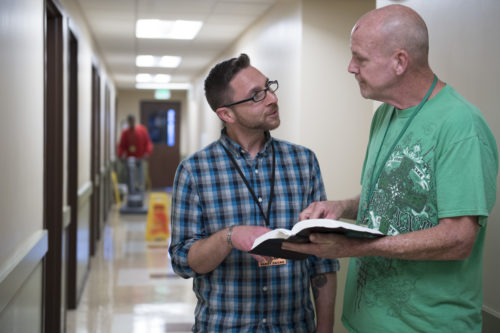“I’m a runner,” says Joseph. “I’ve been running all my life… and now I’m 61.”
As a child, Joseph remembers walking in on his father abusing his sisters. After quitting school, a traumatized young Joseph fled his home and began living on the streets. Sleeping in empty stairwells or abandoned cars, he befriended local addicts who turned him on to drugs and alcohol at the tender age of 9.
“I tried to commit suicide during my teenage years,” Joseph says. “I didn’t love myself. I hated myself.”
After surviving a decade on the streets, Joseph began selling drugs – living with different women and fathering several children of his own. Police came looking for Joseph after he began missing child support payments. Again, Joseph ran and hid.
After locating him, local authorities checked Joseph into a hospital psychiatric ward. His assigned psychiatrist recommended Joseph come to Helping Up Mission.
Joseph refused… intending to flee again. But his sister insisted. Having survived the same family circumstances and addictions her brother suffered, she begged Joseph to listen to HUM’s experienced staff. She told Joseph this was his last chance at life.
Through generosity like yours, Joseph began receiving treatment, healthcare, spiritual counseling, and a new vision of his future at HUM. For the very first time, Joseph says he feels alive as his suicidal tendencies have subsided.
“When you’ve been told that you were nobody your entire life, that you would never amount to anything,” Joseph tears up, “It takes coming to a place like this to change everything.”
“After getting sober here, I learned that I could be successful at something. Before, I never completed anything. Now, for the very first time, I’m completing things. God even blessed me with the gift of music.”
Through singing, producing, and playing gospel music, Joseph found a favorite outlet with which he could thank God for giving him a second chance.
Even Joseph’s children have seen the changes in their father and begun visiting him. “I failed at being a father,” says Joseph. “But if I can help just one of them now, it’s never too late.”
Joseph is excited about graduating from our Spiritual Recovery Program and returning to society. He’s learned how to cope with his inner child, replacing the reflex to escape with a new focus on personal aspirations.
“I thank God for Helping Up Mission, it’s such a blessing. I’d be dead without this place. Thank you so much for giving me my life back.”
Enthusiasm spreads across Joseph’s face when he shares his plans of reconnecting with his kids and shooting a music video for his song, aptly entitled “Then came Jesus.”
Fear has been replaced by faith. Today, Joseph doesn’t have to run anymore.
“I came from the depths of hell. But now I want to live.”
—Joseph
Help more people like Joseph today…
Joseph’s story of hope and healing at HUM is incredible… and made possible by you. Our Spiritual Recovery Program offers men and women the guidance and love to change their lives forever. Give a gift now to help more people like Joseph experience a second chance and a new way forward in life!
